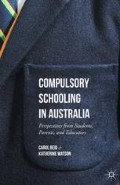Abstract
In this concluding chapter, we return to the heretical question posed at the start of the book, “what if more schooling leads to a more precarious future for young people?,” and suggest that, indeed, more schooling is not necessarily better, particularly in a policy context driven by neoliberal imperatives, where the youth labor market has collapsed, where future labor markets remain unclear, and where choice in real terms for many is just not available.
Access this chapter
Tax calculation will be finalised at checkout
Purchases are for personal use only
Preview
Unable to display preview. Download preview PDF.
Notes
G. Standing, The Precariat: The New Dangerous Class (London: Bloomsbury, 2011).
B. Lingard and S. Sellar, “Globalization, Edu-business and Network Governance: The Policy Sociology of Stephen J. Ball and Rethinking Education Policy Analysis,” London Review of Education 11, no. 3 (2013): 265–280.
M. Dovemark and D. Beach, “Academic Work on a Back-Burner: Habituating Students in the Upper-Secondary School towards Marginality and a Life in the Precariat,” International Journal of Inclusive Education 19, no. 6 (2014): 583–594.
R. Connell, “Using Southern Theory: Decolonizing Social Thought in Theory, Research and Application,” Planning Theory 13, no. 2 (2014): 7.
M. Singh and R. Harreveld, Deschooling Learning: Young Adults and the New Spirit of Capitalism (Basingstoke, Hampshire: Palgrave Macmillan, 2014).
R. Connell, “Good Teachers on Dangerous Ground: Towards a New View of Teacher Quality and Professionalism,” Critical Studies in Education 50, no. 3 (2009): 213–229; D. Ravitch, The Death and Life of the Great American School System: How Testing and Choice Are Undermining Education, revised and expanded edition (New York: Basic Books, 2011); S. L. Robertson, “‘Placing’ Teachers in Global Governance Agendas,” Comparative Education Review 56, no. 4 (2012): 584–607.
L. Boltanski, The New Spirit of Capitalism (London, New York: Verso, 2005).
U. Beck, Risk Society: Towards a New Modernity (London: Sage, 1992); K. Nairn and J. Higgins, “New Zealand’s Neoliberal Generation: Tracing Discourses of Economic (Ir)rationality,” International Journal of Qualitative Studies in Education 20, no. 3 (2007): 261–281.
F. Shain, The New Folk Devils: Muslim Boys and Education in England (Stoke on Trent: Trentham, 2011).
P. Taylor Webb and K. N. Gulson, Policy, Geophilosophy and Education (Rotterdam: Sense Publishers, 2015).
A. Appadurai, Modernity at Large: Cultural Dimensions of Globalization (Minneapolis: University of Minnesota Press, 1996).
C. James, Life at the Intersection: Community, Class and Schooling (Halifax, Nova Scotia: Fernwood, 2012).
J. Smyth, “Critically Engaged Community Capacity Building and the ‘Community Organizing’ Approach in Disadvantaged Contexts,” Critical Studies in Education 50, no. 1 (2009): 9–22.
E. Smyth and J. Banks, “‘There Was Never Really Any Question of Anything Else’: Young People’s Agency, Institutional Habitus and the Transition to Higher Education,” British Journal of Sociology of Education 33, no. 2 (2012): 263–281.
J. Pearce and F. C. Gulbenkian, At the Heart of the Community Economy: Community Enterprise in a Changing World (London: Calouste Gulbenkian Foundation, 1993).
U. Beck, “The Reinvention of Politics: Towards a Theory of Reflexive Modernization,” in Reflexive Modernization: Politics, Tradition and Aesthetics in the Modern Social Order, ed. U. Beck, A. Giddens, and S. Lash (Cambridge: Polity Press, 1994).
Ibid.; Pearce and Gulbenkian, At the Heart of the Community Economy.
C. Reid and A. Sriprakash, “The Possibility of Cosmopolitan Learning: Reflecting on Future Directions for Diversity Teacher Education in Australia,” Asia-Pacific Journal of Teacher Education 40, no. 1 (2012), 15–29.
Copyright information
© 2016 Carol Reid and Katherine Watson
About this chapter
Cite this chapter
Reid, C., Watson, K. (2016). Conclusion. In: Compulsory Schooling in Australia. Palgrave Macmillan, New York. https://doi.org/10.1057/9781137518132_8
Download citation
DOI: https://doi.org/10.1057/9781137518132_8
Publisher Name: Palgrave Macmillan, New York
Print ISBN: 978-1-349-55683-0
Online ISBN: 978-1-137-51813-2
eBook Packages: EducationEducation (R0)

